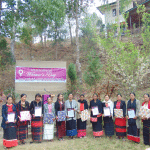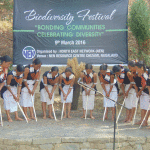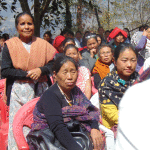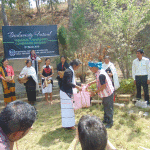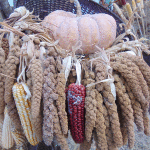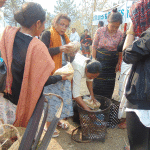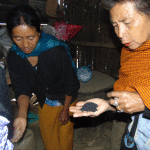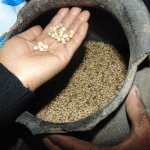NESFAS, for a second time around, was invited to be a part of the International Women’s Day and Biodiversity Festival at Chizami, Nagaland, annually organised by the North East Network (NEN), a women’s rights organisation working in the north east region of India with a focus on women’s human rights. From the 8th to 9th March, NESFAS representatives including Merrysha Nongrum, Associate, NESFAS and Custodian Farmers Kong Yardalin Kharbhoi, Laitthemlangsah Village; Kong Spermon Kharnaior, Pyrda Village and Bah Rialsing Muksor, Moosakhia Village joined participants from other states and Nagaland in celebrating women and biodiversity.
On the 8th, women leaders from villages of Nagaland were honoured by the organizers to mark the International Women’s Day for giving voice to women in their village councils, and ensuring equal wages for men and women. With the theme ‘Planet 50-50: Stepping Up for Gender Equality,’ the NEN Nagaland chapter also brought together women from Meghalaya, Manipur, Telangana, Assam, Dimapur and Kohima to Phek district’s Chizami village, making it a significant and relevant platform to honour women leaders from neighbouring villages.
Kong Yardalin was highly impressed with her fellow participants, “Though the villages are situated in rural areas, the women farmers of Nagaland are active and smart and the villages are quite developed” she said.
The Biodiversity Festival on the 9th was a celebration of food biodiversity of the various participating villages. An array of seeds and food products were up for display as farmers brought out their best with pride. The platform was set for knowledge exchange and learning as well as seed exchange for the farmers.
“Though I do not understand the language, I understand the importance of the biodiversity fair and commend the participants and organisers of this of the Fair”, expressed Bah Rialsing Muksor who was extremely happy to be a part of the event. Bah Realsing as well as Kong Spermon and Yardalin have expressed the desire to organise such events in their villages because they feel that it will be instrumental in rekindling respect for agriculture and environment among the people of his and neighbouring villages.
Reported by Merrysha Nongrum
 Translate
Translate
